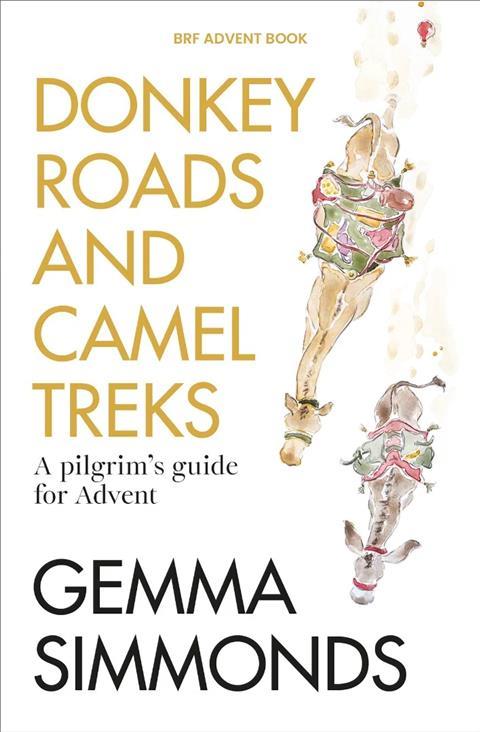This new Advent devotional invites readers to journey slowly towards Christmas, offering daily reflections and prayers as an antidote to seasonal busyness and a way to rediscover the deeper spiritual meaning of the season

Donkey Roads and Camel Treks: A pilgrim’s guide for Advent (Bible Reading Fellowship) is a welcome invitation to slow down as Christmas fast approaches – to take the journey to Bethlehem at the pace of a donkey or a camel, to savour each day and enjoy the experience of travelling slowly towards the birth – and the wonder – of the newborn King.
But be warned: slowing down, especially at Christmas, is a seriously counter-cultural act. In the weeks leading up to the big day, there’s so much to do, so much happening – both inside and outside the church. Shopping, planning, travelling, socialising – all this activity can easily crowd out the deep spiritual meaning, the expectation and the wonder…the waiting for the Saviour to be born.
How can we push back against the frantic busyness? How do we carve out quiet space in the sometimes-manic rush to welcome Christ the King?
This accessible ‘pilgrim’s guide’ could be the answer for many. You will need to set aside some time and quiet space – to join the journey to Bethlehem. But in doing so, you’ll see Advent and Christmas through a deeper, richer lens. It may even transform how you experience the season altogether.
Your guide is Roman Catholic sister, broadcaster and spiritual director Gemma Simmonds – a wise and sensitive fellow traveller as you journey together step by step towards the stable and the crib.
Each day includes a Bible reading, a short commentary spanning a few pages, points for reflection, and a closing prayer.
Setting aside time for these daily readings and meditations could offer a much-needed antidote to Advent anxiety as Christmas draws near.
Each week carries its own theme – From Captivity to Reconciliation, The Transforming Power of God’s Presence, Hope in Darkness, and Transformation – drawing together the week’s scripture readings into a unified journey.
Simmonds’ perceptive insights draw on her own life experience and study, as well as contemporary films and books, and timeless wisdom from Christian figures such as Julian of Norwich, St Augustine of Hippo, and John Newton. She brings a deep passion for the season to her writing, explaining: “The waiting of Advent is a very special process. The more we inhabit that waiting time and space, the more our capacity grows for receiving what we’re waiting for…The wonderful Advent scriptures, hymns and carols speak not only of people but the whole of creation waiting in joyful anticipation for Emmanuel, God with us.”
The author uncovers rich meaning in the familiar Christmas story, offering refreshing insights. She reminds readers that the themes, scriptures, and songs of Advent and Christmas overflow with abundance – that when we give God even a small opening, he multiplies it beyond measure. Just as Jesus fed thousands with a few loaves and fish, he can take our smallest offerings of faith, hope, and love and transform them into something abundant and life-giving.
She also draws out themes from the Advent and Christmas narratives that resonate with contemporary politics, writing: “Legislation that would make it easier to kill the unborn, the terminally ill, the frail elderly and the disabled sits uncomfortably well within the story of Herod and his massacre of the innocents.” Our world today – marked by war, injustice, poverty, discrimination and the abuse of power – would feel painfully familiar to anyone living in Bethlehem under Roman rule. Simmonds reflects that the very circumstances we most dread – poverty, uncertainty, isolation, betrayal, and death – are the conditions into which Jesus deliberately enters, revealing God’s presence in the midst of human suffering.

This book invites readers to go deeper – to reflect, examine themselves, and use Advent as an opportunity to draw closer to God. It also includes a helpful set of questions for group study, ideal for church home groups journeying together towards Christmas.
Simmonds’ reflection for Christmas Day reminds readers that, while the commercial world views 25 December as the end of the season, for Christians it is only the beginning. She explains that Christmas Day marks the start of a 40-day season culminating on 2 February, when many traditional churches celebrate Candlemas – the day Mary and Joseph presented Jesus at the temple.
She encourages readers to use the full 40 days to reflect on the richness of Christmas: “stretching it out as long as you possibly can.” Her exhortation is joyful and countercultural: “Keep your crib up, your lights bright, your candles burning and your carols being sung until February 2nd – enjoy unwrapping God’s Christmas present to you every day as you reflect on the Word of God made flesh, God with us – and savour every moment!”
You can decide how long your Advent and Christmas journey will continue – but investing time in this pilgrimage will, I believe, bring rich rewards.







































No comments yet